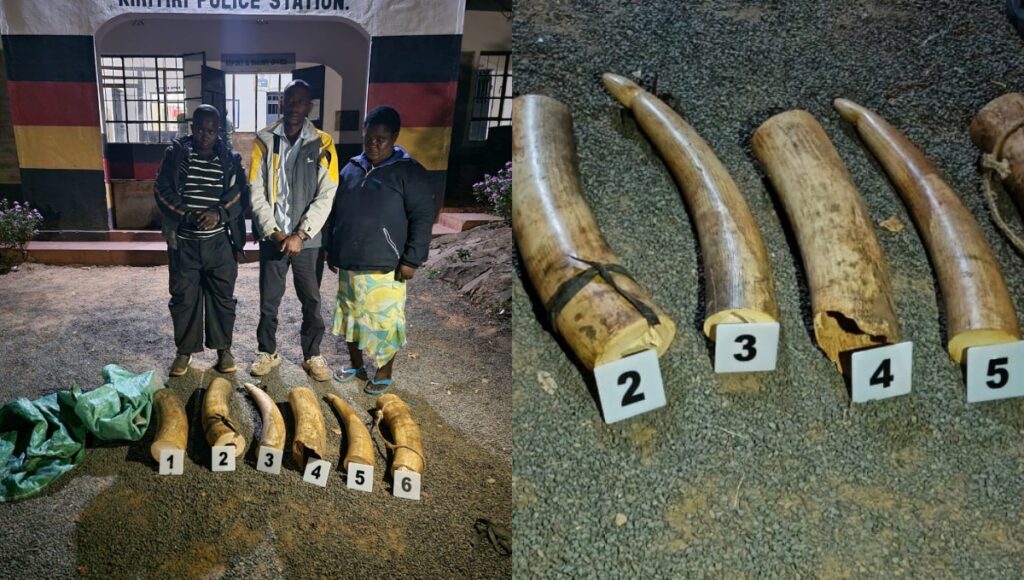Law enforcement agencies in Kenya have intensified their efforts to combat wildlife trafficking, leading to significant breakthroughs in recent multi-agency operations conducted in Embu and Meru counties. These operations have resulted in the seizure of large quantities of elephant tusks and the arrest of several suspects involved in the illegal wildlife trade. The crackdown highlights the government’s ongoing commitment to preserving endangered species and tackling the illicit trade that threatens Kenya’s wildlife heritage.
In Mbeere South, Embu County, a coordinated operation involving various law enforcement agencies successfully intercepted and apprehended three individuals suspected of trafficking in wildlife trophies. The operation took place at the Siakago-Kiritiri Junction, where the suspects were found transporting six pieces of elephant tusks. The tusks, collectively weighing 48 kilograms, were concealed inside two gunny bags, indicating an attempt to smuggle the contraband undetected.
The suspects—Michael Kariuki, Morris Kariuki Njuki, and Margaret Syombua Mutua—were arrested on charges related to dealing in and possessing wildlife trophies of an endangered species without a valid permit. Following their arrest, they were arraigned at the Siakago Law Courts and remain in custody pending further investigations. Authorities have scheduled a pre-bail report, with the investigation period extending until June 11, 2025, as efforts to dismantle the trafficking network continue.
The successful bust in Embu is a testament to the enhanced collaboration between multiple agencies tasked with enforcing wildlife protection laws. The joint efforts not only disrupt illegal wildlife trade but also serve as a deterrent to would-be traffickers who exploit porous borders and weak enforcement to smuggle protected animal parts.
In a related operation, a separate multi-agency team consisting of officers from the National Police Service and the Kenya Wildlife Service (KWS) carried out a targeted security sweep in Meru Town. This operation, which took place on Njuri Ncheke Street near PostBank, led to the arrest of two suspects found in possession of seven elephant tusks weighing approximately 14 kilograms.
The arrested individuals are currently held in custody as authorities prepare to arraign them in court. The seizure of these tusks contributes to the broader national effort to curb illegal wildlife trafficking and protect Kenya’s elephant population, which continues to face threats from poachers and illegal traders driven by the high demand for ivory.
Wildlife trafficking remains a serious crime with devastating consequences for biodiversity and Kenya’s natural heritage. Elephant tusks, often smuggled out of the country for their ivory, fetch high prices in illegal markets, incentivizing poachers to kill elephants despite conservation efforts. The increased vigilance by law enforcement and wildlife authorities aims to cut off these illegal supply chains, protect endangered species, and preserve the ecological balance.
The recent busts in Embu and Meru counties reinforce the importance of multi-agency cooperation in tackling wildlife crimes. By pooling resources, intelligence, and operational capacity, these agencies enhance their ability to respond effectively to the complex and often covert nature of wildlife trafficking networks.
Kenya Wildlife Service continues to urge the public to report any suspicious activities related to wildlife crime. Community involvement is seen as a crucial component in the fight against poaching and trafficking, helping authorities track down offenders and protect vulnerable species.
These operations also highlight the ongoing need for stringent enforcement of wildlife protection laws and international cooperation to dismantle transnational trafficking syndicates. As Kenya strengthens its legal framework and enforcement mechanisms, the hope is to see a significant reduction in illegal wildlife trade, ensuring a safer future for the country’s majestic elephants and other endangered species.
The fight against wildlife trafficking is far from over, but the recent successes in Embu and Meru demonstrate that coordinated, determined action can make a difference in protecting Kenya’s wildlife treasures for generations to come.

